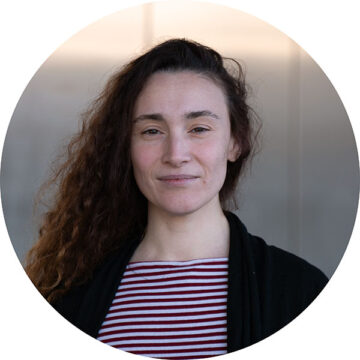
Women’s Voices: Enrica Montalban

This month in Women’s Voices, Sara Carracedo interviewes Enrica Montalban, an Italian postdoc researcher working at Nutrineuro in the NutriPsy team. The research interests of Enrica include reward and dopamine in the context of psychiatric disorders. She has been recently awarded with the Marian Diamond Prize, aiming to highlight women neuroscientists at the post-doctoral period.
Sara Carracedo: Could you please introduce yourself and provide a brief background about your academic journey?
Enrica Montalban: My academic career started at the University of Rome “La Sapienza”, where I obtained my master’s degree. Having collected encouraging results during my internship, I decided to pursue my research before starting a PhD. I hence secured a grant and completed my project at the European Brain Research Institute, in Rome. In 2012, I obtained a Marie Skłodowska-Curie Initial training network fellowship and started, under the supervision of Dr. Girault, a joint PhD between the Institut du Fer à Moulin in Paris and the Prof. Greengard’s laboratory at Rockefeller University (New York). The aim of my project was to identify the molecular mechanisms underlying long-term adaptations of dopamine sensitive neurons of the striatum to reward processing-related physiological and pathological states. As during my PhD I developed a strong interest in the neurobiological bases linking reward alterations to eating disorders, in 2018 – thanks to the obtention of post-doctoral fellowship from the Fondation pour la Recherche Médicale- I joined the laboratory of Dr. Luquet with the aim of understanding the interactions between metabolic and reward circuits in the control of feeding. I moved to Bordeaux in 2022.
Could you tell us more about your current research focus?
Following my first postdoc, I developed a strong interest in the interaction between nutrition and inflammation in the vulnerability to psychiatric diseases related to a dysregulation of the reward system, and in particular major depression. In May 2022, I therefore decided to join the NutriNeuro laboratory headed by Dr. Capuron. Within her group, I proposed a translational research project, aiming at exploring the hypothesis that cerebral astrogliosis induced by adiposity-related inflammation is directly responsible for a disturbance in dopamine transmission, thus participating to the onset of depressive symptoms such as loss of motivation. I am therefore currently conducting a translational project exploring the link between astrocytes and dopamine transmission using chemogenetics to selectively manipulate astrocytes and in vivo imaging coupled with dopamine sensors in behaving animals. In parallel I am using dopamine radioligands coupled to positron emission tomography (PET) to assess dopamine levels in relation with depressive symptomatology in obese patients.
You received the Marian Diamond Award in 2024, an initiative of the Bordeaux Neurocampus Parity Committee. Can you tell us about the academic achievements or recognitions you have received during your PhD?
For my PhD I have had the chance to be selected for a Marie Skłodowska-Curie Initial training network fellowship (NPLAST). The fellowship covered almost all of my PhD and it has been a unique chance to interact very early in my career with already established and talented scientists. My PhD work was then central for obtaining a post-doctoral fellowship from the Fondation pour la Recherche Médicale. My work has also been awarded by the Fondation de Treilles, from which I obtained the “Young Researcher Award”.
You are currently part of the Neurocampus Parity and Inclusion Committee, what motivated you to join this group? Which initiatives from this committee do you think are particularly important?
During my academic journey I understood that recognizing unequal treatment is not always easy. The principal motivation(s) that I have in participating to the parity committee is to make people more aware of gender biases and to be involved in the effort of identifying and preventing unequal behaviour at all levels, not only within the scientific system, but also regarding our everyday life in the lab. Diversity is crucial to our society and to the progress of science, participating in this committee is a great way to contribute to emphasizing it. I very much appreciate the work that the NeuroPIC has been doing. Data regarding gender bias are being collected and analyzed with scientific rigor through well-designed surveys. This work is of particular importance as it might open the eyes of scientists in the community through actual, undeniable numbers. This is a crucial step to make the community face the problem with objectivity and a steppingstone to tackle the causes of inequality.
How do you balance the demands of research and personal life? Do you think this balance is more challenging for women in academia?
I have always been very passionate with my research projects, therefore for a long time working hard was just a part of my “personal life”, in particular in the early stage of my career. I guess that one of the keys is to try to understand that putting some distance between personal life and research is beneficial even from a professional perspective. It is always more productive to think with a fresh mind. Keeping a balance can be complicated and I do think that it is way more challenging for women. I am experiencing this even more now, as a senior post-doc in a critical point of her career and as a mother of a 16-month-old child. While my situation is particularly understandable and accepted by our society, I do think that motherhood is only one of the scenarios in which a woman will struggle more to keep a balance. For example, we can still come across stories in which a woman needs to produce more in order to demonstrate her professional value. Which of course will impact on her personal life.
What advice would you give to other early career women in neuroscience who might be facing gender bias or discrimination?
My first advice would be to keep doing their research the best they can. Good research will be recognized, independently from the gender. I also advise to try to have an honest and trustworthy network of scientists to refer to when doubting of research projects or career ambitions. It is also crucial to be intransigent against any form of gender bias and discrimination that we or others can be facing. This implies to be able to detect them, starting from the language and the way of interacting with women. Although academia still has room for improvement, the system is changing in the good direction and could become an example for society. It is therefore crucial that everyone feels concerned and participates in this challenge by identifying the everyday biases and discriminations, and actively acts against them.
About “Women’s voice”
This interview was done by Sara Carracedo (PhD student at IMN)
Women’s Voices is an interview published in Brainstorm (every two interviewes) and on Neurocampus’ website created in partnership with the Neurocampus Parity and Inclusion Committee (NeuroPIC) a local group committed to promoting equality and organizing actions to close the gap between women and men in academia. The goal of this section is to increase the visibility of early career female researchers at the Bordeaux Neurocampus of the University of Bordeaux. We interview researchers about their scientific contributions, insights and opinions about equity, diversity and gender bias in academia. Through these interviewes, we aim not only to highlight their achievements but also to serve as inspiration for our scientific community and other female scientists.
Last update 14/01/25
